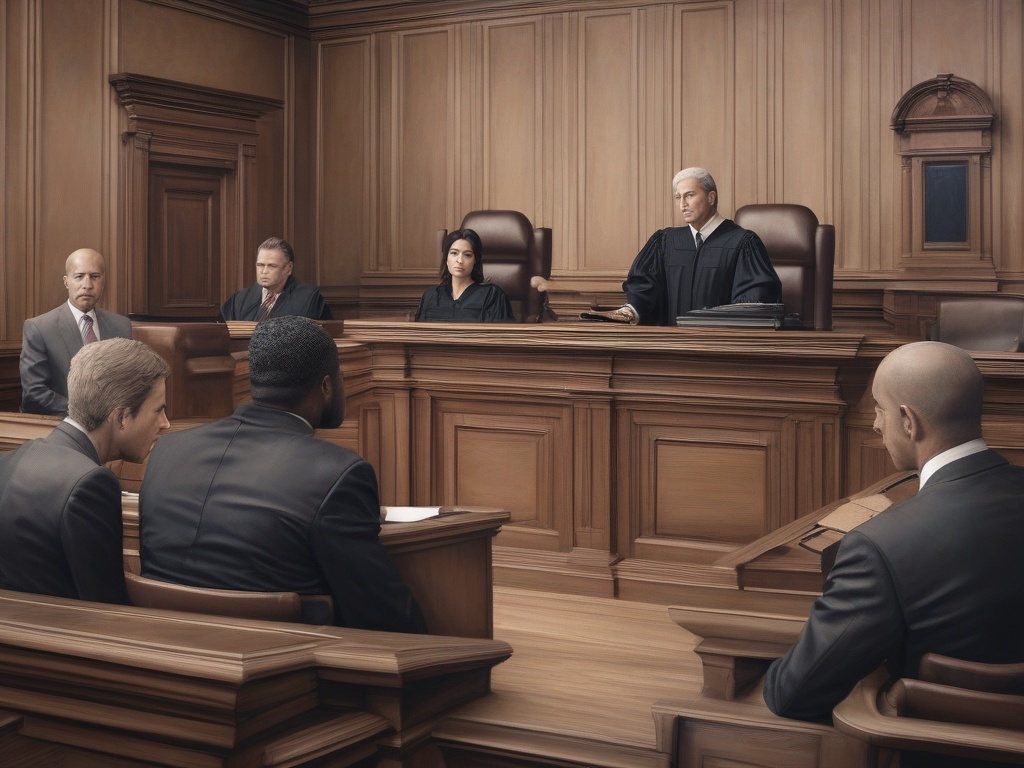
Championing Justice: The Arsenal of a Defense Lawyer in the Courtroom
In the intricate arena of criminal justice, a defense lawyer’s role extends far beyond mere representation. They are the guardians of the accused, wielding a formidable arsenal of legal expertise, investigative skills, and strategic tactics. This arsenal is meticulously crafted to challenge prosecutorial claims, scrutinize evidence, and ensure that every individual receives a fair trial. Behind the scenes, these legal warriors analyze case law, gather vital evidence, and craft compelling arguments that can turn the tide of justice in favor of their clients.
Once inside the courtroom, a defense lawyer transforms into a master tactician, employing their arsenal with precision. They meticulously cross-examine witnesses, expose inconsistencies, and present alternative narratives that cast doubt on the prosecution’s case. Their ability to think quickly, adapt strategies, and communicate convincingly often determines the outcome of the trial. Moreover, they serve as a crucial buffer, safeguarding their client’s rights against procedural errors, prosecutorial overreach, and courtroom biases. This role is not just about legal battles but about championing the fundamental principles of justice and fairness, ensuring that no individual is wrongfully convicted.
The Art of Persuasion: Crafting a Compelling Defense Strategy
Within the high-stakes environment of the courtroom, a defense lawyer’s ability to craft a persuasive narrative can be the decisive factor that shapes the outcome of a case. This art of persuasion is not merely about presenting facts; it involves weaving a coherent and emotionally resonant story that resonates with judges and jurors alike. The defense attorney meticulously analyzes every piece of evidence, identifying gaps, inconsistencies, or alternative explanations that can be highlighted to create reasonable doubt. This strategic storytelling transforms raw legal data into a compelling argument that challenges the prosecution’s case and underscores the innocence or mitigates the culpability of the accused.
Effective persuasion begins with understanding the audience—judges, jurors, and even the opposing counsel—and tailoring the message to resonate on intellectual and emotional levels. The defense lawyer employs a combination of logical reasoning, powerful rhetoric, and empathetic appeal to influence perceptions and sway decision-making. They anticipate objections, counterarguments, and potential biases, preparing responses that reinforce their narrative while dismantling the prosecution’s credibility. In essence, the art of persuasion is about establishing trust and credibility, transforming legal technicalities into a relatable and convincing story that advocates for justice.
Crafting a compelling defense requires more than just collecting evidence; it demands a strategic approach to its presentation. Skilled defense lawyers know how to select the most impactful pieces of evidence and frame them within a narrative that highlights reasonable doubt or extenuating circumstances. They may use expert testimonies, forensic reports, or character references to bolster their case, ensuring each element seamlessly contributes to a cohesive story. The narrative must be persuasive enough to persuade the jury that the prosecution’s case lacks certainty, and that the defendant’s innocence or lesser guilt deserves recognition. This process involves an intricate balance of logical argumentation and emotional appeal, designed to leave a lasting impression that favors the defendant’s cause.
Ultimately, a masterful defense strategy is an artful blend of meticulous preparation, persuasive storytelling, and adaptive courtroom tactics. It transforms complex legal concepts into a compelling case that resonates with the core principles of justice, ensuring that every defendant receives a vigorous and effective defense. This dynamic interplay of evidence, narrative, and persuasion exemplifies the true power of a skilled defense lawyer—championing fairness and integrity in the pursuit of justice.
Guardians of the Accused: Upholding Rights and Ensuring Fair Trials
In the complex landscape of criminal justice, the defense lawyer stands as a formidable protector of individual rights, tirelessly working to shield their clients from potential miscarriages of justice. Their role is not confined solely to courtroom advocacy; it extends into safeguarding constitutional guarantees that form the bedrock of fair trials. As guardians of the accused, these legal professionals meticulously scrutinize every procedural step, ensuring that the state’s power is exercised within legal boundaries and that their clients’ liberties are preserved at every stage of the process.
Upholding procedural fairness is paramount. Defense attorneys vigilantly monitor the conduct of law enforcement and prosecutors, challenging any violations of rights such as illegal searches, coerced confessions, or improper evidence collection. Their advocacy often involves filing motions to suppress evidence obtained unlawfully, which can significantly alter the trajectory of a case. By doing so, they reinforce the principle that justice must be rooted in legality, not bias or overreach. This relentless defense of procedural integrity not only protects individuals but also fortifies the entire judicial system, safeguarding its legitimacy and fairness.
Moreover, defense lawyers serve as critical interpreters of legal rights, ensuring their clients understand the implications of every decision and plea. They advocate for fair treatment, insisting that every accused person receive a trial that respects their dignity and presumes innocence until proven guilty. Their role extends beyond legal technicalities; it involves empathetic representation that recognizes the profound emotional and social toll on the accused. This unwavering dedication transforms courtroom battles into a moral quest for justice, emphasizing that every person deserves an equitable chance to defend themselves against the weight of the state’s power.
At the heart of their responsibilities, defense attorneys vigorously defend due process rights—ensuring that every step of the judicial process adheres to established legal standards. They scrutinize the legality of arrests, the fairness of pre-trial procedures, and the transparency of hearings, all while advocating for their clients’ right to a public, impartial trial. In high-stakes litigation, this role is crucial; it acts as a check against arbitrary or unjust actions by authorities. By meticulously challenging procedural flaws, defense lawyers help prevent wrongful convictions and reinforce the integrity of the justice system. Their vigilance guarantees that justice is not only done but seen to be done, emphasizing the fundamental principle that every individual is entitled to a fair and unbiased trial.
